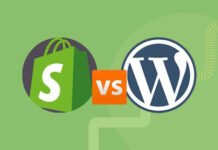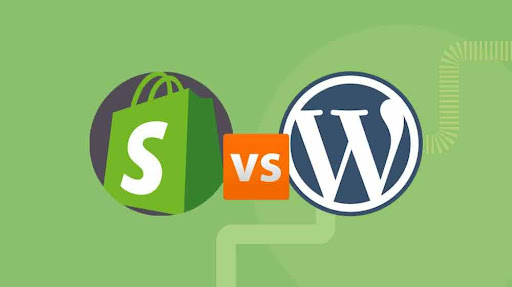Any business that wants to be profitable and reach global customers needs a well-designed and fully functional online store. For this, the popular choice of the masses is either Shopify or WordPress. Both of these programs offer incredible benefits for people who just want a website up and running in the shortest amount of time.
In this article, we will explore more features and understand which platform is better for your business.
Differences between Shopify and WordPress
Shopify is a whole-some package of e-commerce platforms. It offers services ranging from online store editing to domain and hosting. However, you can also take Shopify into the real world with an integrated point-of-sale (POS) system. You can also sync online and on-site sales with in-built inventories and features to manage orders.
WordPres is one of the most popular systems when it comes to managing content. It doesn’t have any preloaded features and that is simply so that the developer can add them as per their needs, in the form of plugins and manual codes. This is done to avoid any space that is not utilized. This way, WordPress gives the users complete freedom to design and feature the website as per their needs.

What can you do with Shopify?
Shopify is a web application that has been built to help businesses build and launch their own eCommerce store. It is a software-as-a-service (SaaS) entity. You cannot own the software but you can use it to build your online store. However, you need to pay a small monthly fee to be able to continue using it.
There are multiple templates available within the platform that can be customized according to your brand. You can sell your products, both physically and digitally, through a Shopify store.
The best part is that you don’t need to have any coding skills to use the platform. However, people who know HTML and CSS would be able to further customize the website apart from the given templates.
Shopify is a hosting platform, meaning your website will function using the servers of Shopify. You don’t need a separate hosting platform or to install other 3rd party software to run your digital business. Since it is a web application, everything runs in the cloud, so you can run your business from any place that has an internet connection and a system with a web browser.
Why Shopify?
Shopify offers robust customer support that is available 24/7. Due to the complex nature of eCommerce stores, business owners need an additional hand when it comes to making sure that they get all the support they need, right from listing their products to managing inventory to delivering the product to the end customer.
Websites built with Shopify have a higher loading speed and their templates are optimized for all devices to ensure a smooth shopping experience for customers. Such highly responsive websites attract the most traffic.
Shopify themes are also SEO-friendly. If the website fulfills all of Google’s requirements, it will make sure that your website ranks higher in SERP and attracts a lot of traffic, thereby boosting sales for your products. Apart from being SEO optimized, Shopify also offers marketing strategies such as email marketing, gift cards, coupons, store statistics, and more.

What can you do with WordPress?
WordPress is also a popular content management system; you can build your business alongside your personal blog. It has an intuitive dashboard, which makes it easy to add new products, make changes to the cost, update your inventory, and more.
Design your website to reflect your brand with a slew of customisable templates and add plugins to make sure your website stands out from the competition. WordPress also provides multiple secure payment and shipping options, making the shopping experience a breeze for end users.
For a basic setup, WordPress offers a no-cost plan as it is open source software. However, you might have to pay for upgrades and certain plugins. There are multiple free themes and plugins that are available so you can have a professional-looking website right from the get-go. The website can also be scaled up or down depending on your business needs, the number of people visiting your site, the increase in the number of products and more.
You can manage your inventory better with the advanced inventory management features. Track your stock inflow and outflow for your products in real time to understand the demand for each of your products. Predict the stock requirements for your products to maintain adequate inventory for your best-selling products.
Why WordPress?
WordPress websites come with inbuilt analytics and reporting features. Get valuable insights on your website’s performance with regards to sales, website traffic, and customer behavior (bounce rate,time spent on each product, etc.) in real time. Get a fair idea of what strategy works and make data-backed decisions for the growth of your online store.
You can integrate WordPress websites with popular marketing tools such as MailChimp and Google Analytics, among others. It also aids in creating targeted marketing campaigns for your products and services to attract more customers while you engage and upsell to your existing customer base.
Making sure that your website is safe and that the information that customers share with you is not misused is a prime concern for any digital business owner. WordPress offers security plugins for your website to address any known vulnerabilities and protect it from malware and other online threats.
Conclusion
In conclusion, choosing the right platform based on your business requirements is a bit tricky. Both of these platforms offer SEO optimization, robust customer support, and other common features.
However, go for Shopify if you want your eCommerce store up and running in the shortest amount of time. If you want to customize the end user’s shopping experience and make it smoother, choose WordPress. You can always hire WordPress Developers if you are not sure about the development process.
The success of any online business boils down to the quality of the products and the after sales experience offered to your customers. Choose the platform that fits your budget and reflects your brand identity better.






















